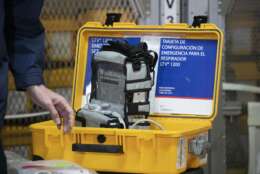Contracts/Awards
-
OMB released much-anticipated guidance giving agencies important direction for how they should implement the provision in the stimulus bill that lets agencies pay contractors to keep them in a state of ready.
April 21, 2020 -
Joanne Woytek, the NASA SEWP program director, said the governmentwide acquisition contract grew 25% in March as compared to the previous month and saw 40% more orders going through the system.
April 17, 2020 -
CenturyLink, Verizon and Granite Telecommunications submitted protests to the Government Accountability Office over task orders under the Enterprise Infrastructure Solutions (EIS) program.
April 16, 2020 -
Long-awaited OIG review of the JEDI procurement also finds ethical violations by two Defense officials, but none that impacted the contract decision.
April 15, 2020 -
Supply and cost are always important drivers for the government to jump in.
April 14, 2020 -
The Defense Department and the Office of the Director of National Intelligence released memos late last week outlining how contractor officers can implement a provision of the stimulus spending bill to pay contractors if they can’t work because of the coronavirus pandemic.
April 14, 2020 -
House Oversight and Reform Committee Chairwoman Carolyn Maloney (D-N.Y.) and Government Operations Subcommittee Chairman Gerry Connolly (D-Va.) have a long list of legislative proposals they want to see included in the next coronavirus rescue package for federal employees and contractors.
April 13, 2020 -
Enforced isolation of the pandemic has made a lot of people a bit lonelier. For veterans already at risk of suicide, the situation deepens the threat.
April 13, 2020 -
The IT Acquisition Advisory Council (IT-AAC) sent a memo to House and Senate lawmakers explaining why the Defense Department should drop its JEDI plan and follow the path of the CIA.
April 13, 2020 -
Sarkis Tatigian joined the Navy in 1942. He’s been there ever since, until his death this week at the age of 96. Read about him and other Defense news in this week's DoD Reporter's Notebook.
April 08, 2020 -
Government contractors are changing the way they are communicating with their clients and seeking more details for how to continue to meet mission needs.
April 07, 2020 -
Agencies expected to award 58 task orders under the Enterprise Infrastructure Solutions (EIS) contract by March 31, but instead awarded 10, putting the $50 billion program on a path similar to the last telecommunications transition debacle.
April 06, 2020 -
For details, Bloomberg Government Director of Contracts Dan Snyder joined Federal Drive with Tom Temin.
April 01, 2020 -
Five of the nine EIS vendors raised concerns about the delays in releasing task orders under EIS, about what the solicitations are asking for and the quality of the requirements detailed in the documents saying the transition is taking on too much of a Networx-like flavor.
March 30, 2020 -
AWS objection argues DoD's corrective action plan doesn't go far enough, and that it should be forced to reopen and reconsider multiple aspects of the contract.
March 24, 2020















